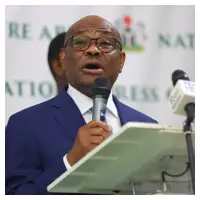The Minister of Works, David Umahi, has provided a detailed explanation for the Tinubu administration's decision to implement tolling on federal roads across Nigeria.
Speaking at the eighth edition of the 2025 Ministerial Press Briefing Session at the National Press Centre in Abuja, Umahi emphasized that road tolling is part of a broader strategy aligned with President Bola Ahmed Tinubu's vision to create a $1 trillion economy while promoting local content.
"Truly, the most important thing is not just building these roads. I've always said that in the past, we have built roads, but this is the only time that a President is constructing roads," Umahi stated, highlighting the administration's focus on durable infrastructure.
The minister pointed out that previous road projects often failed to last up to 50 years, creating a continuous cycle of repairs and reconstruction. With approximately 35 kilometers of roads nationwide, and an additional 3 kilometers expected with the new Legacy Project, Umahi acknowledged the financial challenges facing the government.
"It is difficult for Nigerians, for budgetary provision of the funds of the federal government to complete all these roads," he explained, adding, "That's why we are doing HDMI and of course, the PPP (Public-Private Partnership)."
According to Umahi, the tolling initiative serves a dual purpose: attracting private sector participation and ensuring proper maintenance of the roads. The minister announced plans for stakeholder engagement sessions beginning in the first week of June to appeal to citizens about the importance of tolling completed roads.
"The idea is not only to get these roads constructed but to also maintain them... So that is what informs the reason for tolling. Not just to have the private sector participate just like in every other civilized country, but also ensure that they operate and maintain the roads," Umahi emphasized.
The ministerial briefing was also attended by the Minister of Arts, Culture and the Creative Economy, Hannatu Musawa, and the Minister of Water Resources and Sanitation, Professor Joseph Utsev.













